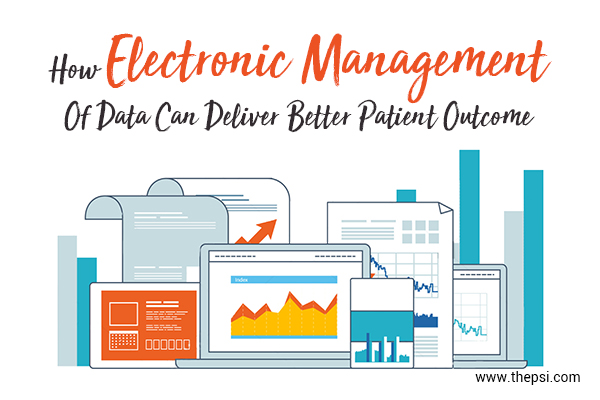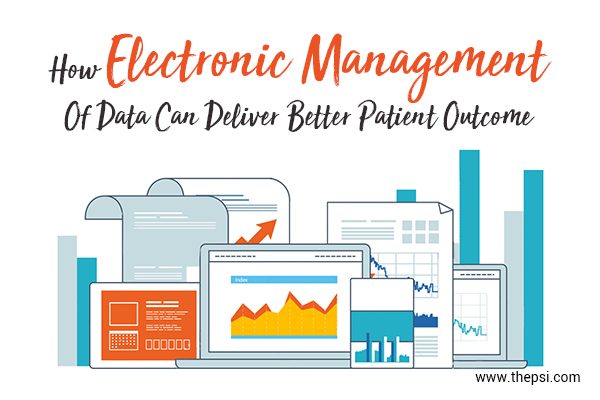
Healthcare providers today, unanimously agree that maintaining patient records is an essential process in healthcare. In the 1960s, most hospitals and healthcare providers in the US relied solely on paper for maintaining such records. This resulted in heaps of paperwork, making the process of managing patient records a mammoth task. Some progressive leaders in healthcare soon realized that only an electronic medical record system can solve this issue. However, creating and maintaining such systems proved to be extremely costly at the time.
Much has changed since then. 98% of hospitals in the US have now been known to demonstrate meaningful use of Electronic Health Records (EHR). Also, according to a report published by Markets And Markets, by 2021 the EHR market is expected to reach $5.2 billion.
This growing popularity of EHR might make you wonder how it can be beneficial for patient outcomes. Her we’ll take a look at some of the ways in which Electronic Data Management can deliver better patient outcomes.
#1: Better Care For Patients
Electronic management of patient records ensures that healthcare providers have easy access to patient information. This helps in diagnosing issues sooner since physicians have a comprehensive view of the patient’s medical condition. Having access to the medical history of a patient prevents physicians from prescribing medicines that might be harmful. For example, if a patient is allergic to certain compounds, knowledge of this is essential for doctors so that they do not give them any medicines containing those substances.
Another advantage of the electronic management of medical data is that it alerts the doctor to any potential conflicts with an ongoing medication when a new medicine is prescribed. Also, there could be situations where a patient has encountered an accident and is unable to explain their medical history. Electronic patient records can help in retrieving a complete history of their health issues, ongoing medications, and test reports. This can help in making informed decisions about patient care quickly.
PSI has worked with many clients in the healthcare space, helping them develop products for efficient medical records tracking and retention. They have utilized their expertise in Database management and handling of bulk SQL queries to create such products.
#2: Improved Efficiency
Electronic data management ensures that your doctors have access to your test reports and previous prescriptions. This also helps in avoiding duplication of tests. For example, one healthcare specialist can easily see the results of a test that another doctor had prescribed. This helps patients save money by repeating the same test again.
Another advantage of this is that it prevents patients from being exposed to x-rays and certain tests with side effects, time and again. With EHR, coordination between primary physicians and hospitals becomes easier too. The exchange of patient information using electronic systems happens instantaneously thus helping in providing healthcare more efficiently.
Dr. Karen Smith says that EHR has enabled her to provide health care much faster to her patients and improved efficiency.
#3: Convenience
Electronic data management ensures that patient records are backup in a centralized system. So if someone is unfortunate to be in an area that has been hit by any natural disaster or a fire, their health records are still preserved. The article explains how EHR are beneficial in times of natural disasters or other emergencies. Also with EHR, when it’s time for patients to take preventive check-ups or screening tests, healthcare providers can contact patients directly. Electronic data management ensures that physicians, pharmacies, and other health team members can share information. So there is no need for patients to fill paper forms and wait for them to be sent from one member of their health team to another. PSI has assisted in creating products that greatly simplifies patient admission and discharge processes. These products can also help in efficient patient scheduling, medication management, and record patient histories, thus helping deliver better patient outcomes.
#4: Information Security
Under the Health Insurance Portability and Accountability Act of 1996 (HIPAA) legislation, healthcare providers are required to keep patient records secure. The law mandates that such records can be shared with only the ones authorized by the regulation or the patients themselves. EHR systems are way more secure than paper-based systems where patient records could be seen by anyone walking by a desk where such a record is kept. PSI has a proven track record of working with clients in healthcare and creating products that help in compliance audits and quality control. These products also keep patient and employee data secure.
#5: Reduction in Errors
Electronic data management helps to eliminate some of the errors that might arise in paper records. Common examples are misspelled words, the different terminology used by different doctors and illegible handwriting. By avoiding errors, electronic data management systems ensure that patient records are more accurate. and complete. More complete and accurate data ensures a better quality of care for patients. Additionally, EHRs are able to minimize these inconsistencies by the use of certain standardized practices. Electronic systems also prevent patient records from getting misplaced or lost. This article talks about how standardization using electronic patient records have resulted in better patient outcomes.
#6: Increased Cost-effectiveness
If patient records are managed electronically, the complete and comprehensive patient history and reports are stored in a centralized location. This means that health care providers do not need to spend time in tracking down and retrieving such information as in a paper-based system.
When medical records are available to healthcare providers instantly, speedy patient care can be provided. This helps healthcare providers save time and therefore money too. According to this report, with electronic data, healthcare providers can have significant savings – $1 for every health plan claim, $1.49 for doctors, and $0.86 for hospitals.
Using Agile development methodology and robust database management capabilities, PSI has helped create products that can speed up healthcare information processing.
#7: Insights
Electronic data management can also include computing systems that can analyze large volumes of data. Such analysis can generate useful insights.
EHR systems can be used to determine health risk factors and analyze patient populations. It also allows you to identify treatment trends and predict any potential disease outbreaks. These are critical to the overall health and wellbeing of people.
Final Thoughts
The EHR market stood at $3.92 billion in 2016 and is predicted to grow at a rate of 5.8% till 2021. This is mainly due to federal regulations and mandates and the increase in geriatric population.
Certain other factors are the need to reduce costs of healthcare and the need for better coordination between healthcare service providers.
PSI has extensive experience in working with many healthcare service providers, helping them with electronic data management. They have helped healthcare providers in creating applications that streamline the electronic data management process.
These products have tried and tested capabilities of efficient management of test flow into and out of labs. PSI has also helped renowned healthcare solutions providers in the US, almost double their portfolio of products.
If you are looking for a cost-effective, solutions driven, technology partner to work on your healthcare related projects, contact PSI now. Healthcare providers today, unanimously agree that maintaining patient records is an essential process in healthcare.
Healthcare providers today, unanimously agree that maintaining patient records is an essential process in healthcare.
In the 1960s, most hospitals and healthcare providers in the US relied solely on paper for maintaining such records. This resulted in heaps of paperwork, making the process of managing patient records a mammoth task.
Some progressive leaders in healthcare soon realized that only an electronic medical record system can solve this issue. However, creating and maintaining such systems proved to be extremely costly at the time.
Much has changed since then. 98% of hospitals in the US have now been known to demonstrate meaningful use of Electronic Health Records (EHR). Also, according to a report published by Markets And Markets, by 2021 the EHR market is expected to reach $5.2 billion.
This growing popularity of EHR might make you wonder how it can be beneficial for patient outcomes. Her we’ll take a look at some of the ways in which Electronic Data Management can deliver better patient outcomes.
#1: Better Care For Patients
Electronic management of patient records ensures that healthcare providers have easy access to patient information. This helps in diagnosing issues sooner since physicians have a comprehensive view of the patient’s medical condition.
Having access to the medical history of a patient prevents physicians from prescribing medicines that might be harmful. For example, if a patient is allergic to certain compounds, knowledge of this is essential for doctors so that they do not give them any medicines containing those substances.
Another advantage of the electronic management of medical data is that it alerts the doctor to any potential conflicts with an ongoing medication when a new medicine is prescribed.
Also, there could be situations where a patient has encountered an accident and is unable to explain their medical history. Electronic patient records can help in retrieving a complete history of their health issues, ongoing medications, and test reports. This can help in making informed decisions about patient care quickly.
PSI has worked with many clients in the healthcare space, helping them develop products for efficient medical records tracking and retention. They have utilized their expertise in Database management and handling of bulk SQL queries to create such products.
#2: Improved Efficiency
Electronic data management ensures that your doctors have access to your test reports and previous prescriptions. This also helps in avoiding duplication of tests.
For example, one healthcare specialist can easily see the results of a test that another doctor had prescribed. This helps patients save money by repeating the same test again.
Another advantage of this is that it prevents patients from being exposed to x-rays and certain tests with side effects, time and again.
With EHR, coordination between primary physicians and hospitals becomes easier too. The exchange of patient information using electronic systems happens instantaneously thus helping in providing healthcare more efficiently.
Dr. Karen Smith says that EHR has enabled her to provide health care much faster to her patients and improved efficiency.
#3: Convenience
Electronic data management ensures that patient records are backup in a centralized system. So if someone is unfortunate to be in an area that has been hit by any natural disaster or a fire, their health records are still preserved. This article explains how EHR are beneficial in times of natural disasters or other emergencies.
Also with EHR, when it’s time for patients to take preventive check-ups or screening tests, healthcare providers can contact patients directly. Electronic data management ensures that physicians, pharmacies, and other health team members can share information. So there is no need for patients to fill paper forms and wait for them to be sent from one member of their health team to another.
PSI has assisted in creating products that greatly simplifies the patient admission and discharge processes. These products can also help in efficient patient scheduling, medication management, and record patient histories, thus helping deliver better patient outcomes.
#4: Information Security
Under the Health Insurance Portability and Accountability Act of 1996 (HIPAA) legislation, healthcare providers are required to keep patient records secure. The law mandates that such records can be shared with only the ones authorized by the regulation or the patients themselves.
EHR systems are way more secure than paper-based systems where patient records could be seen by anyone walking by a desk where such a record is kept.
PSI has a proven track record of working with clients in healthcare and creating products that help in compliance audits and quality control. These products also keep patient and employee data secure.
#5: Reduction in Errors
Electronic data management helps to eliminate some of the errors that might arise in paper records. Common examples are misspelled words, the different terminology used by different doctors and illegible handwriting.
By avoiding errors, electronic data management systems ensure that patient records are more accurate.and complete. More complete and accurate data ensures a better quality of care for patients. Additionally, EHRs are able to minimize these inconsistencies by the use of certain standardized practices. Electronic systems also prevent patient records from getting misplaced or lost.
This article talks about how standardization using electronic patient records have resulted in better patient outcomes.
#6: Increased Cost-effectiveness
If patient records are managed electronically, the complete and comprehensive patient history and reports are stored in a centralized location. This means that health care providers do not need to spend time in tracking down and retrieving such information as in a paper-based system.
When medical records are available to healthcare providers instantly, speedy patient care can be provided. This helps healthcare providers save time and therefore money too. According to this report, with electronic data, healthcare providers can have significant savings – $1 for every health plan claim, $1.49 for doctors, and $0.86 for hospitals.
Using Agile development methodology and robust database management capabilities, PSI has helped create products that can speed up healthcare information processing.
#7: Insights
Electronic data management can also include computing systems that can analyze large volumes of data. Such analysis can generate useful insights.
EHR systems can be used to determine health risk factors and analyze patient populations. It also allows you to identify treatment trends and predict any potential disease outbreaks. These are critical to the overall health and wellbeing of people.
Final Thoughts
The EHR market stood at $3.92 billion in 2016 and is predicted to grow at a rate of 5.8% till 2021. This is mainly due to federal regulations and mandates and the increase in geriatric population.
Certain other factors are the need to reduce costs of healthcare and the need for better coordination between healthcare service providers.
PSI has extensive experience in working with many healthcare service providers, helping them with electronic data management. They have helped healthcare providers in creating applications that streamline the electronic data management process.
These products have tried and tested capabilities of efficient management of test flow into and out of labs. PSI has also helped renowned healthcare solutions providers in the US, almost double their portfolio of products.
If you are looking for a cost-effective, solutions driven, technology partner to work on your healthcare related projects, contact PSI now.[:]








